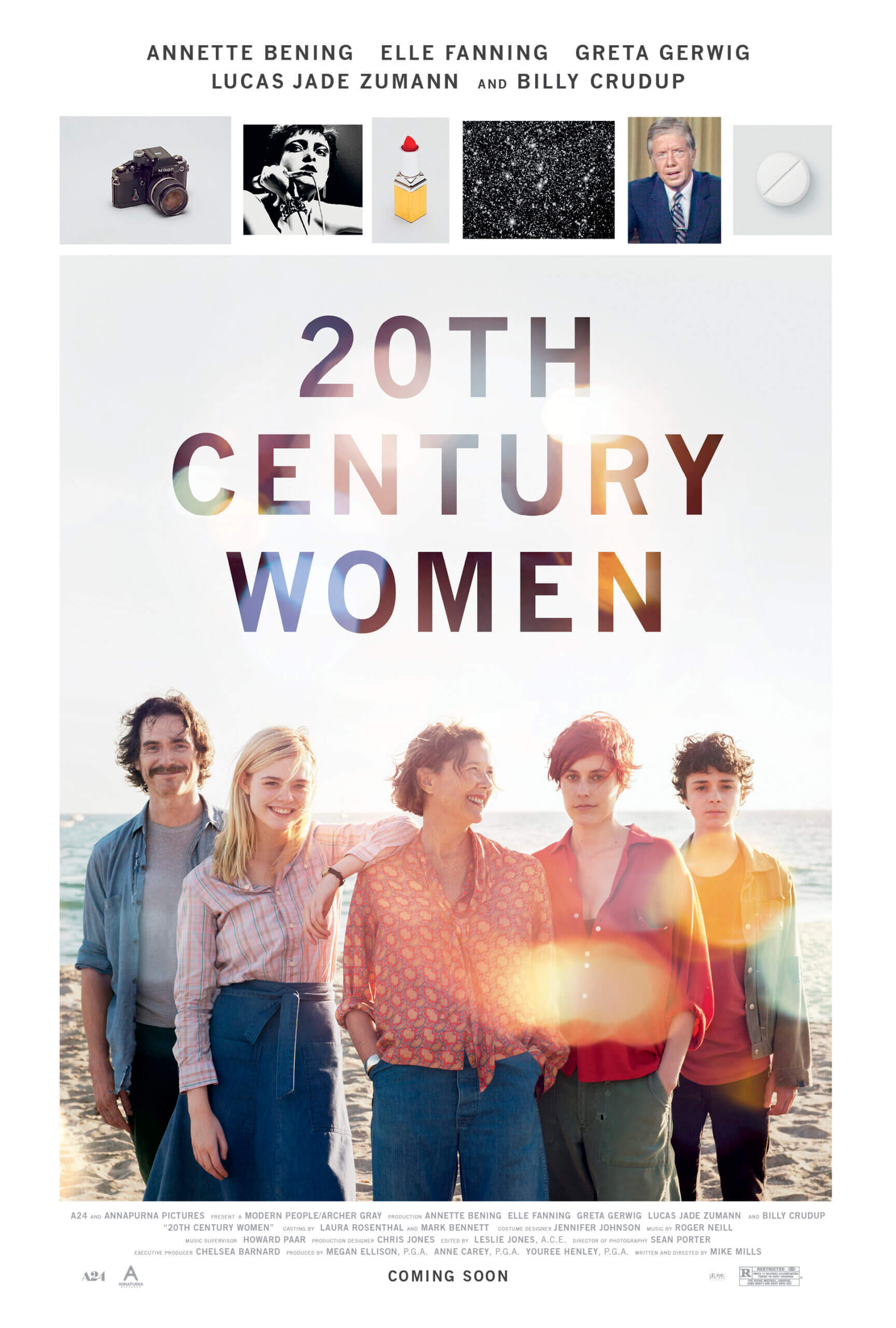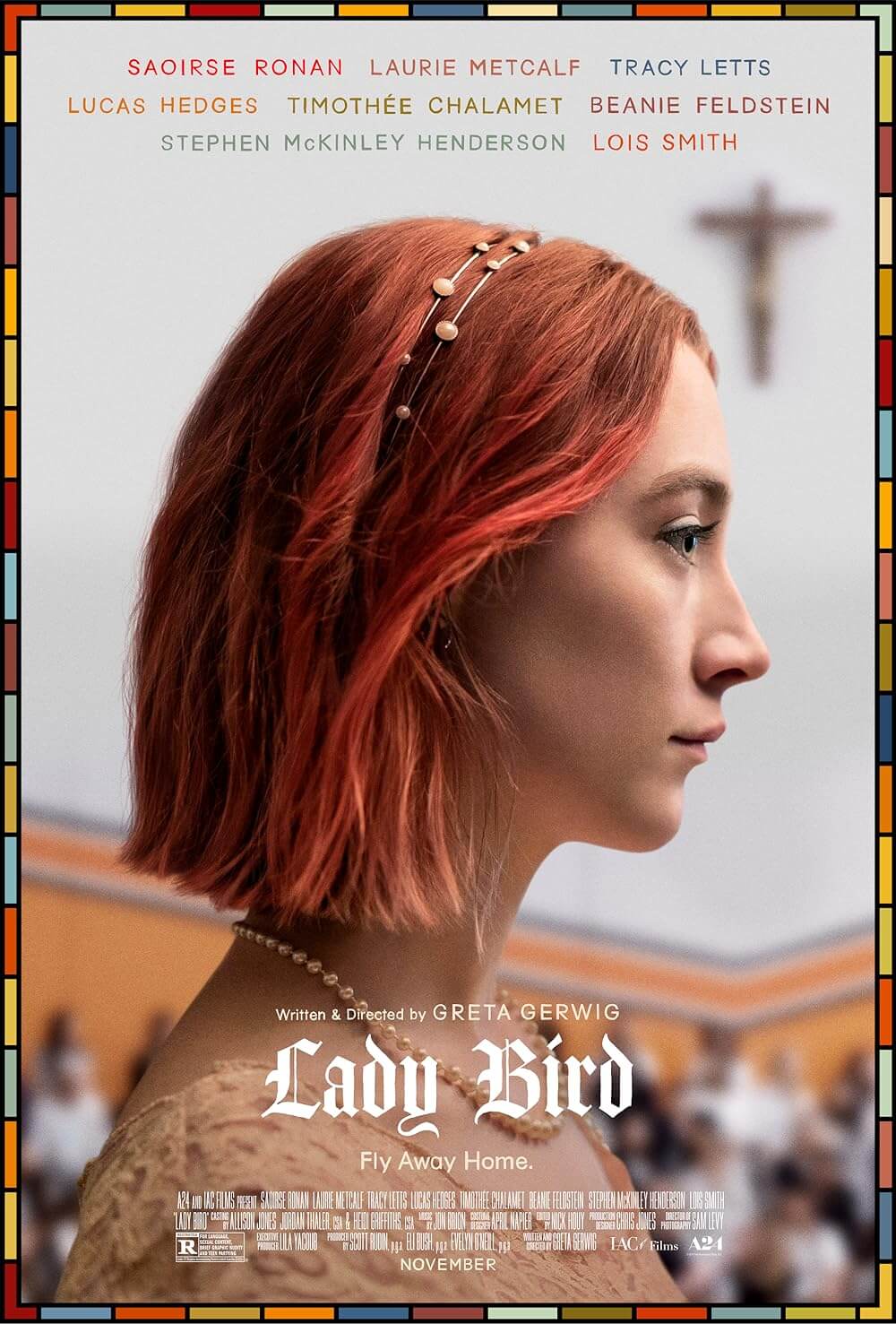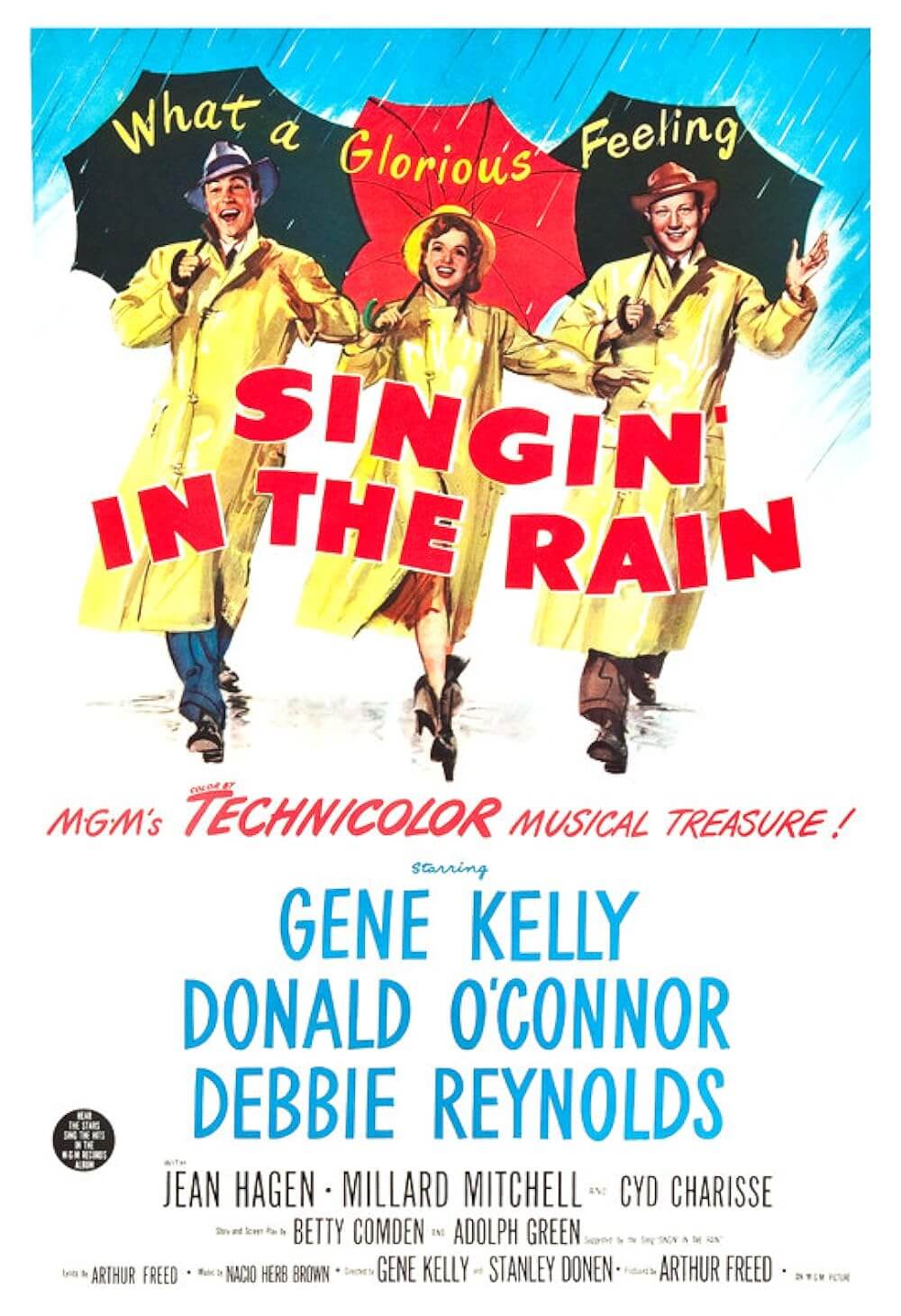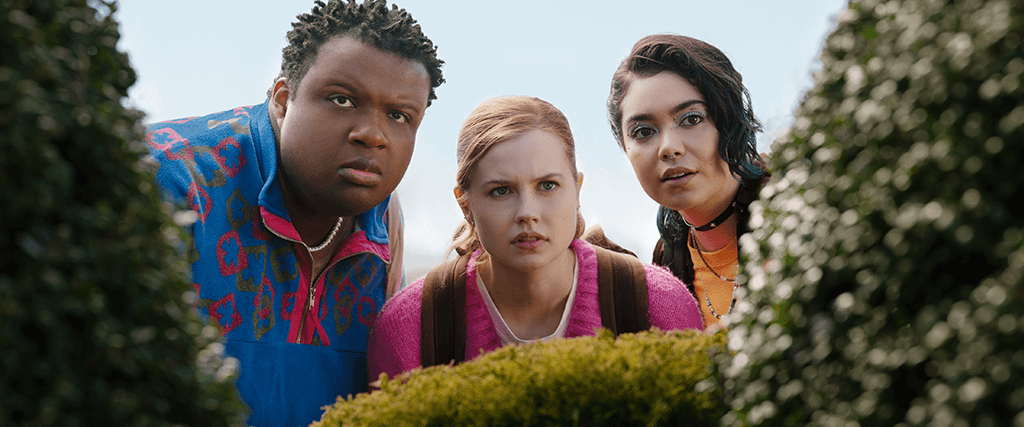
Mean Girls
By Brian Eggert |
Revisiting 2004’s Mean Girls before watching the new musical remake was perhaps a mistake on my part. A few days before sitting down to watch the new feature—which was initially meant for Paramount+, before the studio realized it was better than another disposable streaming original—I refamiliarized myself with the high-school comedy. It’s a funny movie, but it’s not something I regularly rewatch, nor do I have the nostalgic association that many others do (I grew up with Ferris Bueller and Cher Horowitz, not Cady Heron and Regina George). With the story and oft-quoted lines fresh in mind, I sat down for the latest version and found them closely aligned, complete with those famous lines (“Stop trying to make ‘fetch’ happen,” et al.) repeated. Though, in the musical tradition, the songs punctuate the characters’ inner thoughts and feelings. Apart from including social media, which has emerged in the years since the original, specifically TikTok to speak to the target Gen Z audience, the new movie hits all the same story beats. And while superfans and those unfamiliar with the original might enjoy this, the sameness throughout became detrimental for me.
The textual history of the new Mean Girls is intricate. It started with Queen Bees and Wannabes, author Rosalind Wiseman’s 2002 best-selling book, which screenwriter Tina Fey adapted into the 2004 feature directed by Mark Waters. Fey later re-adapted the book (but mostly her screenplay) into a 2017 stage musical (which I have not seen), with music by Jeff Richmond and lyrics by Nell Benjamin. The new movie is a hybrid of the original Lindsay Lohan starrer and the musical; it’s about fifteen minutes longer than the 2004 movie but with fewer songs and a shorter runtime than the stage version. Even so, Fey, who also receives sole credit for the new screenplay, repurposes many of the memorable lines and moments from the original. Instead of using the previous iterations as a launchpad for something new and fresh, yet still inspired by what came before, Fey and company offer an overly familiar experience that never entirely stands on its own merits.
All of this raises questions about what a remake should be. There’s no simple answer. Sometimes, filmmakers take established material and rethink the concept entirely; see David Cronenberg’s The Fly (1986) and Martin Scorsese’s The Departed (2006). Lately, so-called requels such as Creed (2015) have been fashionable, where the result is both a remake and sequel to the original. Others attempt to tell the same story in a different setting for a new generation or in another language, as with Christopher Nolan’s Insomnia (2002) and Steven Spielberg’s War of the Worlds (2005). Mean Girls is an oddity. It’s not a straight remake, given the addition of musical numbers, yet at times, it feels like a shot-for-shot recreation, with dozens of visual and dialogue examples drawing from the 2004 version. But it’s not a requel, despite Fey and co-star Tim Meadows reprising their roles amid the North Shore High School faculty. Yet, some self-aware humor, Brechtian postmodernism, and references to the original movie acknowledge the 2004 movie’s existence, just not within the musical’s narrative world.
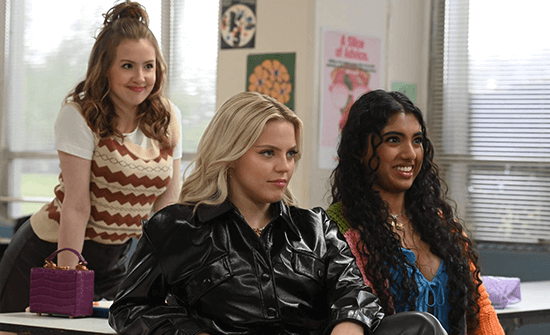 The need to classify the new Mean Girls persists because the result never becomes its own thing, despite a promising new cast. Angourie Rice takes over as Cady, the role originated by Lohan, a home-schooled teen who spent most of her youth in Kenya. Unversed in high-school dynamics, Cady receives a breakdown from outcasts Janis (Auli’i Cravalho) and Damian (Jaquel Spivey). They serve as the morally upright narrators of a “cautionary tale,” though they’re not above assessing their classmates by their cliques. They warn about The Plastics, the ultra-popular trio headed by Alpha girl Regina George (Reneé Rapp, who looks like the original Regina, Rachel McAdams, spliced with Busy Philipps). Bebe Wood brings more vulnerability and dimension to Regina’s cohort, Gretchen. The third Plastic, Karen, is played by Avantika, whose dim-witted routine feels forced next to the original’s excellent Amanda Seyfried. In any case, Cady goes undercover in their group as a goof for Janis and Damian. She’s absorbed, becomes one of them, and soon competes with Regina for the role of queen bee, leading to a school-wide reconciliation about talking behind other people’s backs.
The need to classify the new Mean Girls persists because the result never becomes its own thing, despite a promising new cast. Angourie Rice takes over as Cady, the role originated by Lohan, a home-schooled teen who spent most of her youth in Kenya. Unversed in high-school dynamics, Cady receives a breakdown from outcasts Janis (Auli’i Cravalho) and Damian (Jaquel Spivey). They serve as the morally upright narrators of a “cautionary tale,” though they’re not above assessing their classmates by their cliques. They warn about The Plastics, the ultra-popular trio headed by Alpha girl Regina George (Reneé Rapp, who looks like the original Regina, Rachel McAdams, spliced with Busy Philipps). Bebe Wood brings more vulnerability and dimension to Regina’s cohort, Gretchen. The third Plastic, Karen, is played by Avantika, whose dim-witted routine feels forced next to the original’s excellent Amanda Seyfried. In any case, Cady goes undercover in their group as a goof for Janis and Damian. She’s absorbed, becomes one of them, and soon competes with Regina for the role of queen bee, leading to a school-wide reconciliation about talking behind other people’s backs.
As movie musicals go, this Mean Girls deploys song after song in a pop Broadway style that sounded generic to my ears; I didn’t leave the theater humming one melody. Co-directors Samantha Jayne and Arturo Perez Jr., known best for commercials for Apple and Starbucks and music videos for Justin Timberlake and Finneas, create lively song sequences with colorful cinematography by Bill Kirstein and production design by Kelly McGehee. This is a bright, energetic production, and the cast shines. Rice is terrific, her soft vocals given substance by her ability to emote within them. Rapp, a musician herself, is saddled with sultry tunes intent on reminding us that her character’s name is Regina George. Elsewhere, Jon Hamm plays the gym coach who teaches sex education, though the subplot about his character’s inappropriate relationship with a minor has been removed. The aforementioned Philipps plays Regina’s shallow mother, but bringing back Amy Poehler would have been a wiser choice.
Both movie versions of Mean Girls have a frustrating way of censuring gossip and bullies while at the same time reinforcing beauty standards and intending the hurtful things said about some characters to be funny. The 2004 version was much harsher in that respect, while the movie musical features a cast that looks suspiciously beautiful all around, so no one ever becomes the butt of any mean-spirited jokes about appearances. But aside from a few superficial differences, the new version takes the viewer on the same narrative journey, often with identical gags and dialogue. It’s not so carbon copied that it earns comparison to Gus Van Sant’s 1998 take on Psycho (1960), where the alterations appear so minuscule that the only reason it exists is an artistic experiment. But it’s not different enough—like the various takes on A Star is Born—to complement its predecessor, nor does it feel vital as a unique adaptation. Regardless, most of the performances and production details are admirable; it’s only the intertextuality and familiarity that may hinder one’s enjoyment.
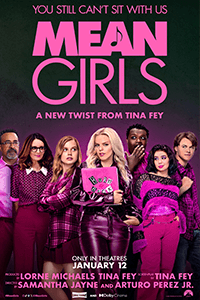
Unlock More from Deep Focus Review
To keep Deep Focus Review independent, I rely on the generous support of readers like you. By joining our Patreon community or making a one-time donation, you’ll help cover site maintenance and research materials so I can focus on creating more movie reviews and critical analysis. Patrons receive early access to reviews and essays, plus a closer connection to a community of fellow film lovers. If you value my work, please consider supporting DFR on Patreon or show your support in other ways.
Thank you for your readership!
Brian Eggert | Critic, Founder
Deep Focus Review


